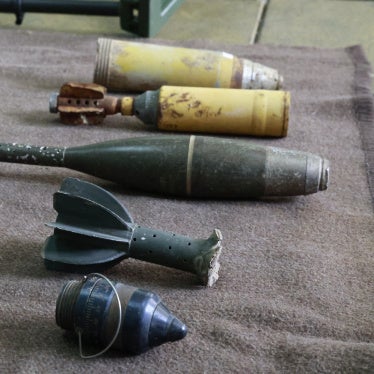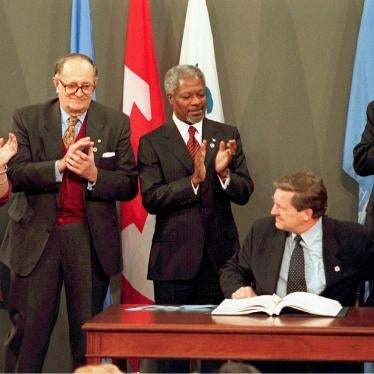Introduction
The Convention on Cluster Munitions seeks to end the significant humanitarian harm cluster munitions pose to civilians. It prohibits the use, production, stockpiling, and transfer of cluster munitions, as well as assistance with any of these activities. The convention also includes a provision (Article 21) on interoperability, which allows a state party to engage in joint military operations with states that are not party to the convention, even if those states reserve the right to use cluster munitions. During the negotiations of the convention, states expressed differing interpretations concerning the relationship between the absolute prohibitions contained in Article 1 and the interoperability provision in Article 21. Now that the convention has entered into force, states parties should clarify their understandings on this important question.
Article 21 should be read to allow participation in joint military operations only when it does not amount to assistance with acts prohibited by the convention. Some have argued that the ban on assistance does not apply during joint military operations. Such an interpretation is contrary to both the text and the object and purpose of the convention. The preamble describes the convention's goal as: "to put an end for all time to the suffering and casualties caused by cluster munitions." Allowing an exception to the prohibition on assistance could seriously undermine this aim. Cluster munitions and the harm they cause will never be eliminated if Article 21 is understood to permit parties to the convention to assist with acts prohibited under the convention. Thus, the prohibition on assistance must apply at all times, including during joint military operations.
1. What is the prohibition on assistance?
Article 1(1)(c) of the convention prohibits states parties from assisting anyone with any activity that is banned under the convention, including use, production, stockpiling, and transfer. Article 1 opens with the phrase "never under any circumstances," which signals the wide reach of the prohibition. States parties may not assist with any acts banned by the convention during international or non-international armed conflicts or even in situations that do not rise to the level of armed conflict, including peacetime training. The prohibition also applies to assistance to "anyone," which encompasses states not party and non-state actors, such as non-state armed groups or corporations. The assistance that is prohibited should be understood as any act or omission that proximately contributes to anyone's engagement in an activity prohibited to a state party under the convention. At least six other treaties, including the Mine Ban Treaty and the Chemical Weapons Convention, contain similar prohibitions on assistance.
2. What types of activities should the prohibition on assistance be understood to ban?
The prohibition on assistance should be understood to ban a range of activities, such as the transit of cluster munitions through a state party's territory, hosting of foreign stockpiles on a state party's territory, and financial investment in cluster munition production. Other forms of assistance that are particularly relevant to joint military operations and should be understood to be prohibited include, but are not limited to:
- securing, storing, or transporting cluster munitions that belong to a state that is not a party to the convention;
- agreeing to rules of engagement that allow cluster munition use by a state that is not a party to the convention;
- following orders from a state that is not a party to the convention to use cluster munitions;
- requesting a state that is not a party to the convention to use cluster munitions;
- participating in planning for use of cluster munitions by a state that is not a party to the convention; and
- training others to use cluster munitions.
3. Why should the prohibition on assistance be interpreted as encompassing a broad range of activities?
The convention gives the prohibition on assistance prominence as one of its "general obligations" and puts this prohibition on the same level as other core provisions, including the bans on use, production, transfer, and stockpiling of cluster munitions. The placement of the provision in Article 1 and its equation with other banned activities make clear that the prohibition on assistance was intended as a foundation of the convention from which no deviation should be permitted.
Accepted rules of treaty interpretation call for understanding the prohibition on assistance as broad. Under Article 31 of the Vienna Convention on the Law of Treaties, a treaty must be interpreted in context-which includes the text and preamble-and in light of its object and purpose.
The language of Article 1(1)(c) is expansive and unqualified. It specifies that the ban on assistance applies to "anyone" under "any circumstances." Furthermore, the text does not limit the scope of the ban: it does not single out a specific type of assistance, such as that which is direct or indirect, or limit the ban to active assistance. A close reading of Article 1 shows that the ban on assistance is applicable in all situations.
The convention's object and purpose also demand a broad interpretation of the prohibition on assistance. The convention aims, as articulated in its preamble, to eradicate for all time the harm caused by cluster munitions. This harm will never cease, however, unless the prohibition on assistance is understood as absolute.
4. Do the convention's prohibitions, particularly the prohibition on assistance, apply during joint military operations?
Yes. The prohibitions found in Article 1 should be understood to apply during joint military operations. Article 21(3) states:
3. Notwithstanding the provisions of Article 1 of this Convention and in accordance with international law, States Parties, their military personnel or nationals, may engage in military cooperation and operations with States not party to this Convention that might engage in activities prohibited to a State Party.
Article 21(3) explicitly allows states parties to engage in joint military operations or cooperation with states not party that might use cluster munitions. It does not, however, create an exception to any obligations, including Article 1(1)(c)'s prohibition on assisting anyone with acts banned by the convention. Article 21(3) simply serves to clarify that mere participation in joint military operations with states not party is not prohibited under the convention.
Interpreting Article 21(3) as an exception to Article 1 runs counter to the convention's goals and accepted rules of treaty interpretation. Article 21(3)'s reference to "in accordance with international law" requires states parties to abide by, among other instruments, the Vienna Convention on the Law of Treaties, which as described above dictates that treaty provisions should be interpreted in light of a treaty's object and purpose. In the case of the Convention on Cluster Munitions, the preamble makes clear that the object and purpose of the treaty is to ban cluster munition use and to end the suffering of victims "for all time." Any interpretation that creates exceptions to the convention's comprehensive prohibitions should be rejected as undermining the purpose of the treaty. In addition, interpreting the convention to allow an exception would run counter to Article 21's obligations that states parties promote the convention's norms, and thus it would render the article internally incoherent.
5. Are the activities listed in Article 21(4) the only ones prohibited during joint operations?
No. Article 21(4) specifies some of the activities prohibited during joint operations and should be understood as an illustrative list rather than an exhaustive one. Article 21(4) states:
4. Nothing in paragraph 3 of this Article shall authorise a State Party:
a) To develop, produce or otherwise acquire cluster munitions;
b) To itself stockpile or transfer cluster munitions;
c) To itself use cluster munitions; or
d) To expressly request the use of cluster munitions in cases where the choice of munitions used is within its exclusive control.
Understood as an illustrative list, Article 21(4) is consistent with the convention's overarching goal of eliminating cluster munitions. Under this interpretation, activities that are not listed in Article 21(4) are still subject to Article 1(1)(c)'s prohibition on assisting, encouraging, or inducing.
By contrast, interpreting Article 21(4) as an exhaustive list would allow states parties to participate in a range of activities that are otherwise banned by the convention. Acts such as planning a cluster munitions attack with a state not party, hosting foreign stockpiles, refueling vehicles carrying cluster munitions, identifying targets for cluster munitions attacks, or transporting cluster munitions to the battlefront would be permissible. This reading would essentially allow states to load and aim the gun, so long as they did not pull the trigger.
In addition to undermining the purpose of the convention, viewing Article 21(4) as an exhaustive list would conflict with the positive obligation placed on parties under Article 21(2) to discourage cluster munition use. Article 21 would be internally incoherent if it both allowed states parties to assist with cluster munition use by their military partners and required them to discourage such use.
6. What does Article 21 require states parties to do to promote the Convention on Cluster Munitions and its norms? Why are these obligations important?
Article 21(1) and (2) require a state party to take affirmative steps to encourage all other states to ratify or accede to the convention, to notify non-party allies of its obligations under the convention, to promote the convention's norms, and to discourage cluster munition use. These groundbreaking obligations make the preamble's commitment to universalization of the treaty binding and require ongoing efforts to advance the ends of the cluster munition ban in relations with states that are not party to the convention.
These positive obligations recognize that the object and purpose of the treaty-elimination of cluster munitions-can be best achieved through universalization of the convention and its norms. Greater numbers of states parties will not only broaden the legal effect of the convention, but will also demonstrate widespread support for the convention's provisions and further stigmatize cluster munition use. In the long term, attracting a large number of parties can contribute to the convention becoming a part of customary international law, which would be binding on parties and non-parties alike.
7. How should states parties notify allies of their obligations? Why is notification important?
Article 21(2) requires a state party to notify allies of its obligations under the Convention on Cluster Munitions. Notification should take place at both the military and political levels in order to reach all relevant authorities. The state party should reiterate these obligations before operations, at the planning phase, and during operations themselves. Notification can also take place publicly, such as before meetings of states parties to the Convention on Cluster Munitions or the Convention on Conventional Weapons.
In addition to highlighting a state party's opposition to cluster munitions, notification is important for two reasons. First, if aware of a state party's obligations, states that are not party to the convention would be less likely to suggest plans involving cluster munitions because they would not want to force an ally into the uncomfortable situation of choosing between adhering to its legal duties and participating in the military operation. Second, notification should reduce the chance that a state party would inadvertently contravene its own obligations on the battlefield. Armed conflicts often require troops to make last-minute judgment calls about weapons and attacks. If all parties know of each other's obligations, they will be better able to avoid unintentional violations.
8. Will abiding by the convention's prohibitions during joint military operations interfere with relations with allies that are not party to the convention?
No. Abiding by the convention's prohibitions during joint military operations will not, as some argue, hurt relations with allies. States parties can still participate in joint operations with states not party to the convention. Experience with the Mine Ban Treaty, which has a comparable prohibition on assistance, shows that states parties have been able to conduct joint operations with states that are not party to the treaty without violating the ban on assistance. For example, many parties to the Mine Ban Treaty have participated in combat operations with the United States, which has not joined the treaty.
9. How have states interpreted the provisions on assistance and interoperability so far?
Several states have said that the provision on interoperability is not an exception to the prohibition on assistance. Iceland noted that the provision on interoperability "should not be read as entitling States Parties to avoid their specific obligations under the Convention for this limited purpose," that is, for joint military operations. Norway's commentary to its draft legislation states that the prohibition on assistance applies during joint operations. Ecuador stated that Article 21 should under no circumstances be used to circumvent the convention's core prohibitions, including assistance. Lebanon said that the prohibition should take precedence over Article 21 and thus does not allow assistance with any acts prohibited by Article 1. Ireland, in a statement issued to clarify its legislation, wrote that deliberate assistance during a joint operation with an act prohibited under the convention is incompatible with its obligation to promote the convention's norms and discourage the use of cluster munitions. Mexico and Zambia expressed that states parties should not, during joint operations, engage in activity that facilitates the use or transfer of cluster munitions.
10. How should states implement the provisions on assistance and relations with states that are not party to the convention?
States parties should pass strong implementation legislation that stays true to all of the convention's norms and expressly addresses the prohibition on assistance and its application during joint military operations. The legislation should clarify that the prohibition on assistance remains in force even during joint military operations. Implementation legislation should explicitly ban the range of activities that are most likely to occur during such operations. These activities include, but are not limited to, the transit of cluster munitions through the state party's territory and the hosting of foreign stockpiles on the state party's territory. States parties can supplement implementation legislation with other measures and policies. For example, they can develop rules of engagement specifying that, during joint military operations, they will not assist with any activity that is banned by the convention.
States parties should similarly develop laws and policies to implement the positive obligations of Article 21(1) and (2). These implementation measures should require states parties to encourage other states to join the convention and to promote the convention's norms and discourage use, including by openly adopting an interpretation of the prohibition on assistance that applies to joint military operations. The measures should also oblige political and military bodies to notify states parties' allies of their obligations under the convention before and during joint military operations. To help ensure complete implementation, states parties should each designate a government agency to coordinate such activities. Finally, they should make implementation of these obligations public, including through the convention's annual transparency reporting mechanism.








